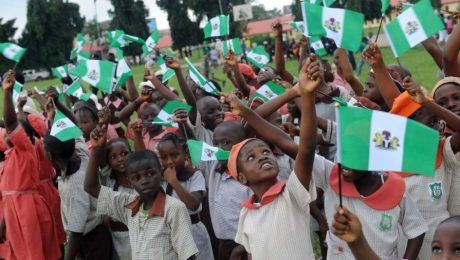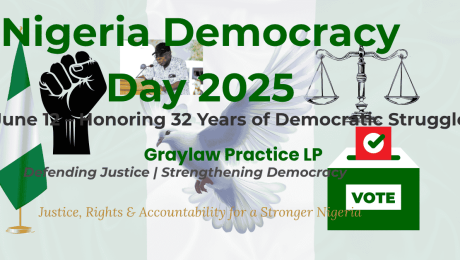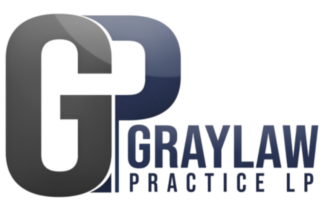On Tuesday, May 27, 2025, Nigeria marked Children’s Day, a nationwide observance dedicated to promoting the rights, welfare, and future of Nigerian children. This year’s theme—“Securing Our Future: Investing in Every Child”—resonated deeply across the country, especially as stakeholders raised growing concerns about insecurity, child abuse, and the lack of legal protection for millions of children.
Graylaw Practice LP Leads Legal Action on Children’s Rights in Nigeria
Among the loudest and most impactful voices was Graylaw Practice LP, a leading Nigerian law firm focused on human rights and public interest advocacy. The firm spearheaded a nationwide legal awareness campaign, offering free legal consultations and child rights education in Abuja and Lagos.
Graylaw organized community sensitization programs at local schools and public centers, where its team of lawyers educated parents, teachers, and children on the Child Rights Act, juvenile justice, and how to report abuse and seek redress. The initiative aimed to bridge the gap between policy and practice in child protection.
Demanding Government Action: From Celebration to Accountability
In a bold public statement, Graylaw Practice LP criticized the practice of celebrating Children’s Day without matching it with policy implementation. The firm called for:
-
Full domestication of the Child Rights Act in all 36 states, especially where it remains unenacted.
-
Greater funding for child welfare services, including child-friendly courts and secure school infrastructure.
-
Fast-tracked prosecution of child abuse cases, including child labor, trafficking, and sexual violence.
-
Deployment of security forces to schools vulnerable to attacks, particularly in the Northwest and Northeast regions.
Graylaw’s Managing Partner noted:
“The safety of Nigerian children is a legal obligation, not a ceremonial wish. We must stop merely talking and start enforcing the laws already in place. This is a national emergency.”
Championing Legal Protection for Every Nigerian Child
Graylaw’s intervention on Children’s Day 2025 underscores the role of legal advocacy in safeguarding child rights in Nigeria. The firm reaffirmed its commitment to promoting justice and holding institutions accountable for violations against children.
The Children’s Day celebration, marked by parades, speeches, and cultural programs, served as a moment of joy—but also a call to action. Thanks to firms like Graylaw, the message is clear: Every Nigerian child deserves safety, justice, and equal opportunity—and the law must lead the way.
On Tuesday, May 27, 2025, Nigeria joined the rest of the world to celebrate Children’s Day, a national observance dedicated to honoring the rights, welfare, and dreams of Nigerian children. The theme for this year’s celebration was “Securing Our Future: Investing in Every Child.” Across the country, state governments, schools, NGOs, and advocacy groups organized parades, symposiums, and talent showcases to recognize the role of children in nation-building and to amplify calls for greater protection and opportunity for the country’s youngest citizens.
Focus on Education, Health, and Safety
As part of the 2025 Children’s Day celebration, governments at both federal and state levels reaffirmed commitments to improving basic education, healthcare, and child protection laws. In Abuja, the Federal Ministry of Women Affairs held a National Children’s Summit, bringing together child rights advocates, policy-makers, and students to discuss access to quality education, ending child labor, and combating child trafficking.
President Bola Ahmed Tinubu, in a special broadcast, emphasized the government’s ongoing efforts to strengthen the Universal Basic Education Commission (UBEC), enhance school feeding programs, and implement digital learning initiatives to reduce the learning gap, particularly in rural areas.
Parades, Awards, and Cultural Showcases
Colorful children’s parades were held in major cities including Lagos, Port Harcourt, Kano, and Enugu. Schoolchildren marched in vibrant uniforms, participated in debates, drama, and musical presentations focused on themes of unity, peace, and civic responsibility.
Several children received awards for excellence in academics, arts, and innovation. In Lagos, a 12-year-old girl was celebrated for developing a mobile app designed to help students learn mathematics through interactive games.
Concerns Over Child Abuse and Insecurity
Despite the festive mood, civil society groups highlighted serious concerns regarding the safety and rights of children in conflict-prone areas. In the Northeast and Northwest regions, insecurity and school kidnappings have disrupted education and traumatized children. NGOs called on the government to prioritize security in school environments and to implement psychological support programs for affected children.
Graylaw’s Contribution
Legal advocacy firm Graylaw Practice LP marked the day by offering free legal aid and awareness sessions on child rights and juvenile justice. Partnering with local schools and community centers in Abuja and Lagos, Graylaw lawyers educated parents, teachers, and children on the Child Rights Act, child abuse prevention, and how to seek redress for violations. The firm emphasized the need for more proactive enforcement of laws protecting children and called for the domestication of the Child Rights Act in all 36 states.
A Day of Hope and Responsibility
As Nigeria grapples with economic and social challenges, Children’s Day 2025 was a poignant reminder of the urgent need to invest in young Nigerians. Leaders, educators, and families were reminded that the strength of the nation lies in the well-being, education, and safety of its children. The day ended with a unified message: a brighter Nigeria begins with empowered children today.
As Nigeria marked Democracy Day on June 12, 2025, Graylaw Practice LP stood as a prominent legal voice, reaffirming its commitment to democratic governance, the rule of law, and constitutional rights. Aligned with its organizational ethos—“Defending Justice, Strengthening Institutions”—Graylaw utilized the occasion to amplify its advocacy for legal reforms, human rights, and accountable leadership.
1. Public Legal Education and Awareness
In commemoration of Democracy Day, Graylaw hosted a virtual legal symposium titled “Democracy and the Law: 32 Years After June 12”, which featured lawyers, civil society leaders, and youth advocates. The firm led discussions on:
-
The legality and implications of the now-withdrawn Compulsory Voting Bill;
-
Electoral justice and the role of the judiciary in sustaining democracy;
-
Strategies for increasing youth and women participation in governance.
This effort mirrors Graylaw’s broader mission to educate the public on civic responsibilities and legal rights, ensuring that democracy is not only celebrated, but understood and defended.
2. Legal Commentary and Policy Advocacy
Senior partners at Graylaw issued a public position paper that critically analyzed the controversial compulsory voting bill, warning that compelling civic participation through punitive legislation would undermine fundamental rights enshrined in the Constitution. The firm’s voice contributed significantly to public pressure that led to the bill’s withdrawal.
Graylaw further called for:
-
Stronger legal frameworks for electoral accountability,
-
Safeguards against voter suppression,
-
Transparent governance free from executive overreach.
3. Pro Bono Support for Victims of Democratic Violations
As part of its Democracy Justice Fund, Graylaw offered pro bono legal representation to citizens facing unlawful detention, political intimidation, or rights violations tied to civic protests. This direct action reinforced the principle that a functioning democracy must protect dissent and respect the rule of law.
4. Empowering Future Defenders of Democracy
Recognizing the importance of youth in democracy’s future, Graylaw launched its 2025 Democracy Legal Fellowship, offering internships to law students focused on human rights litigation, constitutional law, and public interest advocacy.
Conclusion
In marking Democracy Day 2025, Graylaw Practice LP was not merely an observer, but an active defender of Nigeria’s democratic journey. Through public education, legal advocacy, and community service, Graylaw embodied the spirit of June 12—championing justice, defending liberties, and ensuring that democracy remains a lived experience, not just a national memory.
Ready to start a small business in Nigeria? In this insightful video by Graylaw Practice LP, Legal Practitioner Anna Ofunu Ikwuta shares essential steps to launching and sustaining your business the right way. Learn how to choose a profitable idea, write a business plan, register with CAC, open a business bank account, and secure funding. With SMEs contributing 48% to Nigeria’s GDP, you can’t afford to get it wrong. Watch the full video, subscribe to the Law and the People channel, and stay informed with practical legal tips for business success in Nigeria.





